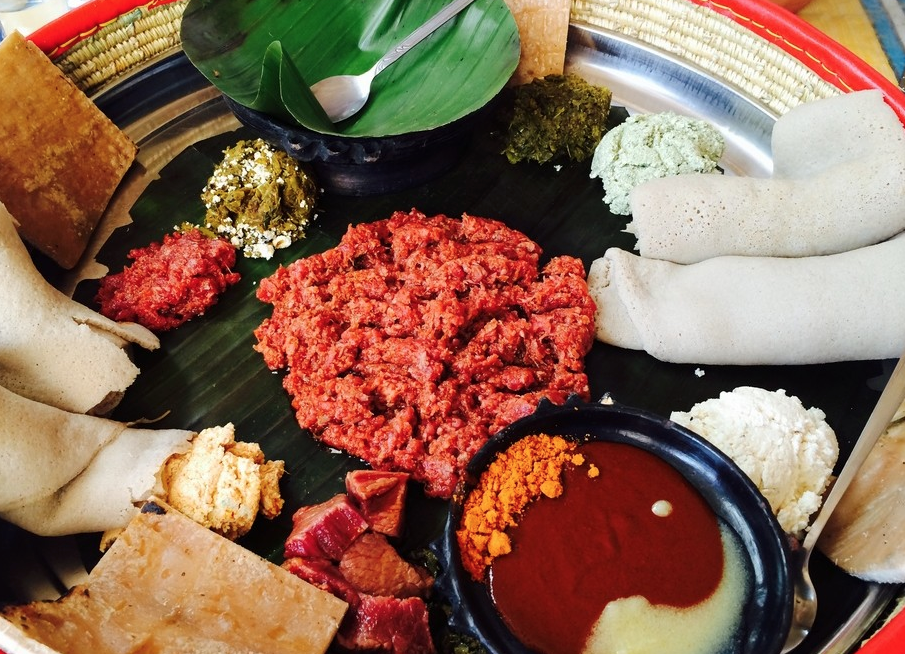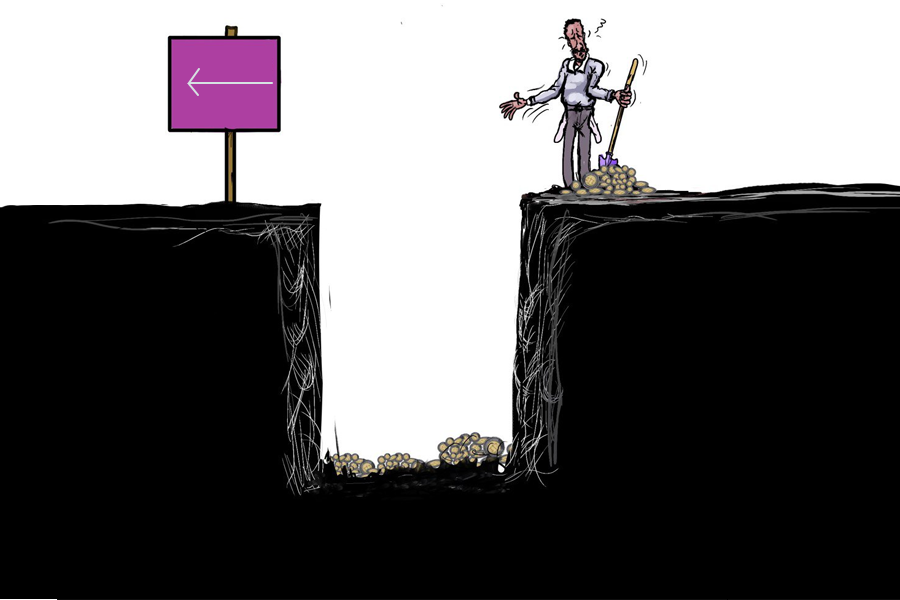
Radar | Apr 13,2025
Kuyso Kuse resides in Fuchucha Kebele, Karat Zuria of Konso Special Zone in Southern Nations, Nationalities & People's Regional State, with his wife and six children. During better days, he grew crops on two hectares of land and reared livestock to make a living and support his family.
Konso and its surrounding areas have long been a setting for protracted instability with conflicts repeatedly arising in the region in recent times. Political and socioeconomic factors are the main driving force behind the clashes. Almost a decade ago, Konso Wereda was incorporated into Segen Area Peoples Zone, and the decision was followed by heavy protests and disruption, which reached its peak during a particularly violent period in 2015.
In September 2018, after many had been killed and displaced during the protests, the regional government allowed the people of Konso to organise the area into a Special Zone. Four weredas, namely Karat Zuria, Kena, Segen Zuria and Karat Town were included within the newly established Special Zone.
The establishment of Konso Special Zone brought about a semblance of stability to the area, but conflicts and armed clashes were recurrent in the surrounding areas. The Zone is bordered by Oromia Regional State, Alle, Derashe, Amaro and Burji special weredas.
Last month, armed conflict erupted in Segen Zuria Wereda. As a result, close to 100,000 people were displaced, many lost their lives, and a significant amount of property was damaged. Fuchucha Kebele, where Kuyso lives, borders Segen Zuria Wereda to the west.
The farmers in the kebeleevacuated their families to safe places fearing that the conflict would soon be at their door.
“We noticed the armed conflict had been drawing nearer to us,” said Kuyso, who sent his wife and children to Karat Town, the capital of Konso Zone. “It was on Friday that we heard heavy noises of armed conflict, and I told my wife and children to go to another area for safety."
They took their six cattle with them, and Kuyso was left behind to watch over the house and their property. The following day, Sunday, November 22, 2020, the armed clashes reached Fuchucha Kebele.
“I didn’t expect the conflict would reach us with that speed,” said Kuyso. “It was very sudden and very frightening.”
Kuyso witnessed over a dozen people being killed.
“I saw 10 people killed with gunfire and billhooks, and five elderly people were immolated with fire,” said the farmer.
Kuyso fled the kebele, home to 1,000 families, to save his life. The perpetrators set his house and two of his small grain warehouses on fire, completely destroying them.
Kuyso’s family lost 30,000 Br worth of property and 10ql of grain that was stored in the warehouses along with six goats. Their two-hectare sorghum cropland was partially destroyed as well.
Out of all the houses in the kebele, only 20 remained standing after the attack. Government offices, schools and a health centre were wholly demolished. Over 50ha of maize cropland was lost, and people fled to Karat Town and Ayle and Torha kebelesseeking shelter.
The internally displaced people, including Kuyso, have faced food shortages.
More than 45,000 people have fled to Sudan, according to the latest United Nations High Commissioner for Refugees (UNHCR) report, due to the military operation in Tigray Regional State. Nearly 45pc of them are children.
“There isn't enough food for ourselves and our livestock,” he said. “When we reached the area, we received a small amount of flour, and we consumed it within two days.”
The farmers have been obliged to wander to far and risky places to look for food to sustain themselves and their families. During the daytime, they travel up to 20Km to their farmland and gather corn in the company of the regional special police force.
The lack of food has also been hard on their livestock. Many cattle have already died due to food shortages, according to Kuso.
“There is no grass or water to feed them," he said. "And I fear that my cattle will soon die from starvation."
The displaced people are hesitant to return to their homes due to fear that the security situation may relapse. The people demand that the regional special police force station there permanently to protect them.
In recent years, Ethiopia has witnessed a rise in violent conflict and armed clashes across the country. Over the past two and a half years, 113 conflicts have engulfed the country, of which the highest numbers were recorded in Oromia and Amhara regional states with 37 and 23 conflicts, respectively, according to Prime Minister Abiy Ahmed (PhD).
Lately, conflicts have erupted in western parts of Oromia, in Benishangul Gumuz, on the borders between Afar and Somali regional states, and most recently between the federal and Tigray Regional State governments.
Due to the military operation in Tigray Regional State, more than 45,000 people have fled to Sudan, according to the latest United Nations High Commissioner for Refugees (UNHCR) report. Nearly 45pc of the refugees are children. The Agency is seeking 147 million dollars to support a projected 100,000 refugees between November and June 2021.
Over 96,000 people in refugee camps in Tigray Regional State are in dire need of food aid, according to the United Nations Office for the Coordination of Humanitarian Affairs (UN-OCHA). The aid agency also called for immediate and unhindered access for humanitarian relief as food rations have neared depletion.
The agency's ongoing Humanitarian Preparedness Plan targets nearly two million people in Tigray, Amhara and Afar regional states, which is on top of the existing caseload and an additional 1.1 million people as a result of the conflict. The projected needs between November 2020 and January 2021 will require nearly 100 million dollars, of which only a quarter has been secured.
In answer to the humanitarian response toward the situation in Tigray Regional State, the government had already informed the Ministry of Peace to prepare, according to Migbaru Ayalew, director of Early Warning & Sustainable Solutions under the Ministry.
"Food and non-food items were pre-positioned at border areas of the Regional State such as Gonder with the collaboration of the National Disaster Risk Management Commission," he said. "We're also sending necessary items to the area."
The Ministry has already assessed the impact, identified the people affected by the conflict and compiled a humanitarian assessment, according to the director.
As a sustainable solution for the recurrent conflicts that are happening in the country, the Ministry is working on studying the root causes of the clashes, according to Migbaru, who says that early warning activities have pre-emptively stopped many conflicts from occurring in the country.
"We've recommended psychosocial support to the people living at Mai-Kadra and Humera," said Migbaru. "Peacebuilding and rebuilding social fabric will follow as a sustainable solution, and it might take one to two years."
A second wave of humanitarian crises could also take place, according to Migbaru, who added that the government is working to stop this from happening.
The conflict and instability along with the pandemic and desert locust infestation can instigate serious food insecurity in the country, according to Messay Mulugeta (PhD), an associate professor of development and food security at Addis Abeba University.
In a report issued last month, the United Nations Food & Agriculture Organisation (FAO) and the World Food Programme (WFP) also said that Ethiopia is likely to face high levels of acute food insecurity due to the civil unrest, growing instability, and the economic fallout brought on by the Novel Coronavirus (COVID-19) pandemic, which includes declining incomes and rising inflation. It also added factors like heavy flooding, landslides, and displacement would likely exacerbate the situation.
Between July and September of this year, 8.5 million people were estimated to be facing critical levels of acute food insecurity, according to the report.
After a slight improvement due to the seasonal harvests, the food insecurity situation is projected to deteriorate further, with about 11.1 million people expected to face a crisis or worse levels of acute food insecurity in various areas from January to June 2021, according to the report.
Migbaru begs to differ on this.
"Before making such kinds of projections," said Migbaru, "the Ministry of Agriculture should go to the ground and conduct a study to determine how much of the cultivated farmland was affected by the locusts and how much impact it will have on productivity."
The desert locust invasions that occurred in recent months were the worst seen in 25 years. The locust swarms have destroyed an estimated 200,000ha of cropland since January.
The Ministry of Agriculture is conducting a study to ascertain the amount of cropland lost to the desert locust swarms.
Yayuh Tilaye, who lives in Bira Kebele, Bati Wereda in the Oromo Special Zone in Amhara Region, has lost his entire two hectares of cropland to the locust swarms.
“They left nothing,” he said sadly.
Farmers in the area where Yayuh resides grow mostly sorghum, and they sometimes sow finger millet. The land is not particularly fertile, but the farmers manage to feed their families and earn some money.
This year, however, was tough and depressing for Yayuh and his neighbours. The farmers are now buying food by selling livestock, because they do not have anything left on their farms. Yayuh has already sold an ox out of his eight cattle to buy food.
Armed clashes have followed the locust invasion in many parts of the country.
A war even in developed countries has serious socioeconomic effects that in turn pose severe food insecurity concerns, according to Messay, the university professor.
“The instability will have effects that remain for three to five years,” Messay said.
The instability and displacement of people will affect the country in terms of production because of damage to products and because people are not producing, and many people will require direct aid, argued the expert.
The FAO has cautioned that a second wave of desert locusts may soon take place. The international organisation stated that heavy rains from cyclone Gati in the Indian Ocean are expected to fall in Somalia and Ethiopia's Somali Regional State, facilitating the maturation of a new wave of desert locusts.
The agency warned that the heavy rains could help immature locust swarms to complete the maturation stage and lay eggs rapidly, and winds may also disperse the swarms to Ethiopia beginning in early December and lasting until the end of the year.
“Intensive survey and control operations should be increased in Ethiopia and Somalia, while heightened vigilance and preparedness are called for in Kenya,” recommended FAO.
The second wave could have devastating effects, and the country should make preparations to avoid the damage, according to Messay.
“Ill-preparation cost the country during the infestation a month ago,” he said.
He recommended that the government allocate a sufficient workforce and assets like drones and chemicals beforehand.
Last month, the United Nations pooled 100 million dollars from its emergency fund to assist seven countries in avoiding famine. Twenty million dollars of this money has been set aside in anticipation of a worsening situation in Ethiopia, according to a statement from Mark Lowcock, Under-Secretary-General for Humanitarian Affairs and Emergency Relief Coordinator at the UN.
There will soon be galloping inflation, especially for food items, according to Messay. He argues that the instability will be fertile ground for illicit activities such as hoarding, contraband, money laundering and corruption across all sectors.
Messay recommends that the farmers whose croplands have been damaged should sow crops that mature in a short period of time.
The only hope for the farmers in the area where Yayuh lives is waiting for rainfall to sow maize so that they can produce food for themselves.
“Due to the mountainous landscape of the area, we can’t irrigate our lands using water from nearby rivers,” said Yayuh.
PUBLISHED ON
Dec 05,2020 [ VOL
21 , NO
1075]

Radar | Apr 13,2025

Radar | Dec 28,2019

View From Arada | Aug 03,2019

Radar | Feb 12,2022

Editorial | Mar 18,2023

Fortune News | Oct 21,2024

My Opinion | Mar 26,2022

Radar | Oct 15,2022

My Opinion | Oct 05,2024

Viewpoints | Jul 22,2023

Dec 22 , 2024 . By TIZITA SHEWAFERAW
Charged with transforming colossal state-owned enterprises into modern and competitiv...

Aug 18 , 2024 . By AKSAH ITALO
Although predictable Yonas Zerihun's job in the ride-hailing service is not immune to...

Jul 28 , 2024 . By TIZITA SHEWAFERAW
Unhabitual, perhaps too many, Samuel Gebreyohannes, 38, used to occasionally enjoy a couple of beers at breakfast. However, he recently swit...

Jul 13 , 2024 . By AKSAH ITALO
Investors who rely on tractors, trucks, and field vehicles for commuting, transporting commodities, and f...

Oct 18 , 2025
The political establishment, notably the ruling party and its top brass, has become p...

Oct 11 , 2025
Ladislas Farago, a roving Associated Press (AP) correspondent, arrived in Ethiopia in...

Oct 4 , 2025
Eyob Tekalegn (PhD) had been in the Governor's chair for only weeks when, on Septembe...

Sep 27 , 2025
Four years into an experiment with “shock therapy” in education, the national moo...